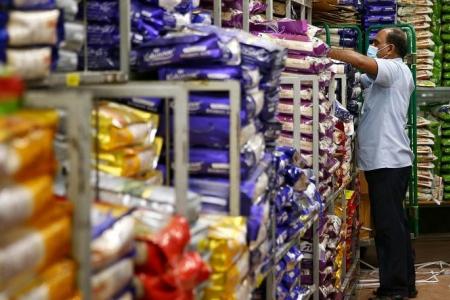'No significant disruption' to rice supply in S'pore, but some may raise prices due to India's export tax
Rice importers here have not faced any "significant disruption" in bringing in rice from India so far, while Singapore's rice imports from countries such as Vietnam and Thailand are still "healthy".
Also, the nation's Rice Stockpile Scheme helps it mitigate the impact of any supply disruptions or price fluctuations, said the Ministry of Trade and Industry (MTI) in response to The Straits Times' query.
India recently imposed a 20 per cent levy on rice exports of key varieties like unmilled and husk brown rice, and banned the export of broken rice, "of which consumption in Singapore is low", MTI said.
It added that the government will continue to monitor the situation and ensure that Singapore has sufficient supply of rice.
Singapore imported $59.8 million of rice from India in 2020, comparable to Vietnam ($57.3 million) but less than Thailand ($123 million) in the same year, according to the Observatory of Economic Complexity.
Under the Rice Stockpile Scheme, rice importers are required to hold an inventory buffer equivalent to two times of their average monthly imports, according to a written Parliamentary reply by Trade and Industry Minister Gan Kim Yong in July. The Rice Stockpile Scheme helps to ensure an adequate supply of rice in the market and to maintain stability of prices during periods of uncertainty and supply shortages.
Supermarket chain Sheng Siong said it would not increase the prices of house brand rice "in the short term", while NTUC FairPrice said the prices of its rice products will remain "stable".
However, other businesses are set to increase their prices due to India's move.
Mustafa Centre, which sources most of its rice products from India, will mark up prices of affected products by 20 per cent when it receives its latest shipment. Its purchasing manager, Mr Mohd Saleem, did not give a date for this shipment.
The 44-year-old said: "There is no issue for supply of rice, only the price will be affected."
Mr V. Rama Murthy of Chennai Trading and Supermarket said his regular bulk-order customers, mostly caterers who provide food for migrant workers, are now hesitant to buy from him.
He is passing on the price increase to his customers by hiking the price of all types of rice, except basmati, by $5 for a 25kg bag from Wednesday.
"Customers are confused and upset at the uncertain situation, and are hesitant to buy in bulk now due to the increase in price," he said, adding that he expects his income to be affected in the long run.
On the other hand, Catering Solutions will not raise prices for its cooked meals for now, even though it upped its rate earlier this year due to Malaysia's chicken export ban.
Instead, the company - which uses five tonnes of rice daily in its meals for foreign workers in the construction, petroleum and marine industries - aims to implement price increases "gradually", said director Mr S. Mahenthiran.
"Prices tend to go up during certain seasons, and fall during other seasons. But this time round, it is a bit different, prices have remained high," the 32-year-old said.
"Furthermore, the Indian government introduced export tax on rice, which took effect on Sept 9. This further inflated the price of rice." he said.
Get The New Paper on your phone with the free TNP app. Download from the Apple App Store or Google Play Store now


